Sangoma Lucky Jayden performs a ritual along with student Mhlekazi Vulindlela honouring the water spirits at Monwabisi beach, Khayelitsha. (David Harrison/M&G)
In the next few weeks, traditional healers will form part of the country’s most significant adult vaccination programme. The past year, however, has forced traditional healers in South Africa to adapt, cope with losing work and perform rituals online.
Celuxolo Stewart, known as Gogo Simenjalo, lights a bundle of impepho and lays out two mats several metres apart in her suburban Johannesburg garden. She says she enjoys being so close to nature now that her spiritual consultations have moved from her traditional indumba room to under the trees.
“I love working in the garden. If our ancestors allow, it’s something that I will keep doing going forward.”
Audio of Celuxolo Stewart, known as Gogo Simenjalo
During the early months of the lockdown, many healers had to close their practices for anything up to four months.
Like Gogo Simenjalo, some took this as a time to rest and re-evaluate their ways of practising, but for many, this was a loss of both income and rapport with their communities.
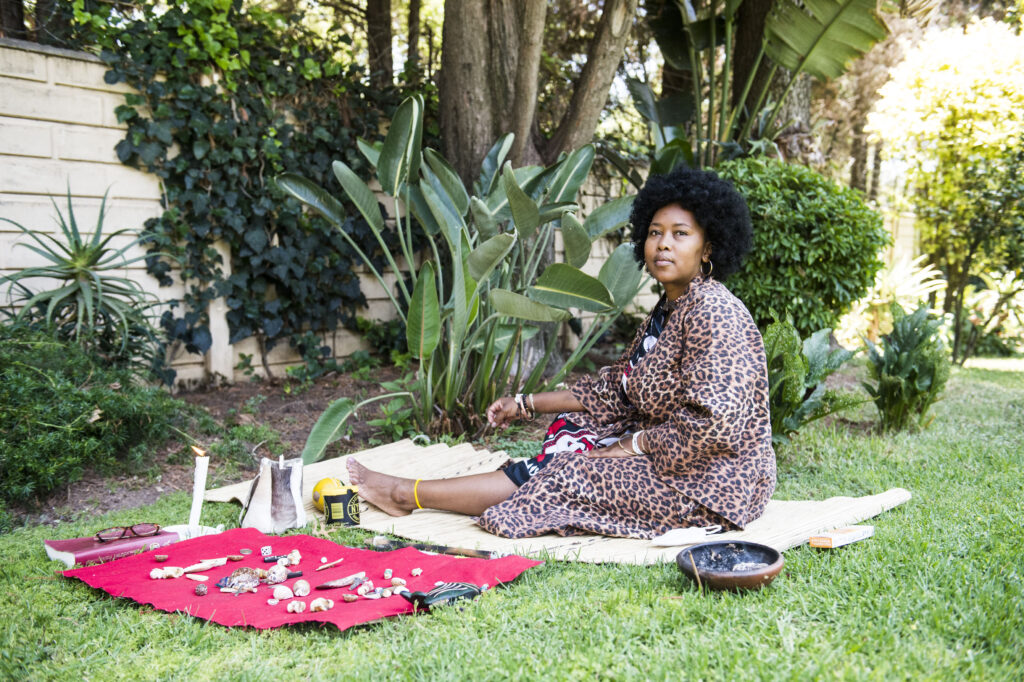 Gogo Simanjelo Stewart consulting from her home. (Delwyn Verasamy/M&G)
Gogo Simanjelo Stewart consulting from her home. (Delwyn Verasamy/M&G)
Janet Mmalai Xaba, known as Gogo Molahlegi, the spokesperson for the Traditional Healers’ Organisation (THO), says that the pandemic has had a significant effect on many healers.
“We did understand because of trying to save lives, but how do you save lives on an empty stomach? That’s why it was a bit tough for us.”
As consultations opened again, the work had to adapt. Whereas most clients were willing to wear masks and sanitise, Gogo Molahlegi says some of THO’s more rural members didn’t have the necessary water to wash hands.
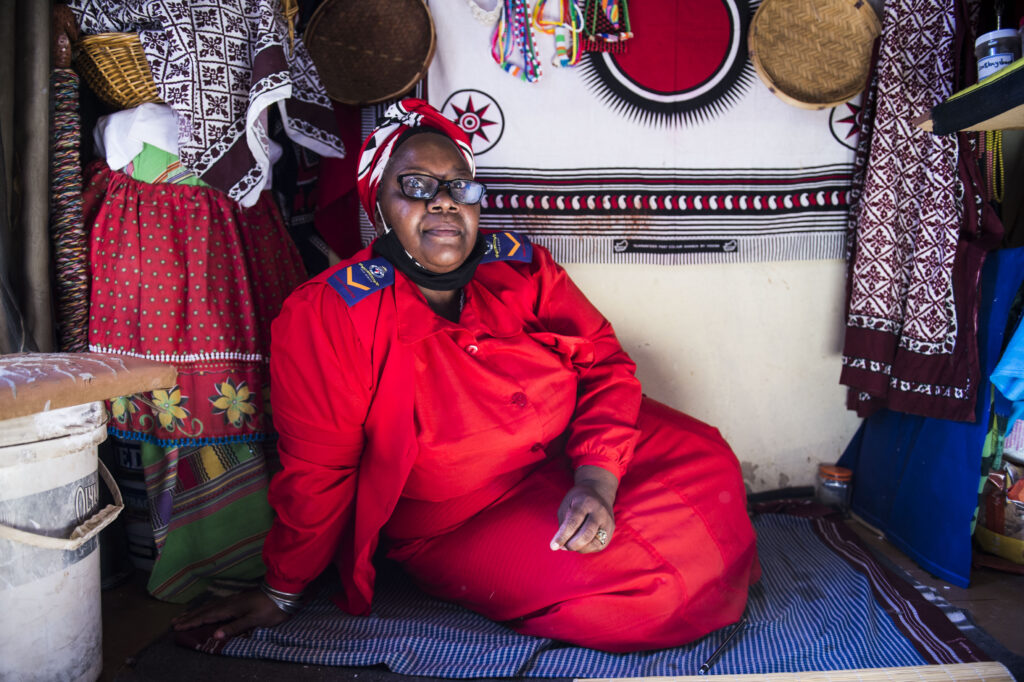 Gogo Mmalai Molahlegi, a traditional healer. (Delwyn Verasamy/M&G)
Gogo Mmalai Molahlegi, a traditional healer. (Delwyn Verasamy/M&G)
Acquisition of herbs for remedies was also hampered while popular traditional medicine markets were closed and harvesters could not access nature freely. Herbalists learned to courier remedies to clients, particularly for respiratory teas, for which there was a high demand.
Social distancing was a more difficult expectation on healers who did not have gardens or bigger spaces or who preferred to practise in their traditional consultation rooms.
A healer in Kempton Park, Keagile Malatji, known as Makhosi Kamo, says they discouraged group and family consultations, and only one person was allowed in the shrine. She moved these appointments online.
Other healers, used to consulting on a spontaneous walk-in basis, had to adapt to scheduling appointments and leaving time between clients to sanitise the space. This has also cut down the number of people they can help, says Gogo Molahlegi.
“For now I only take emergency patients and follow all health protocols so that my patients and I can be safe,” says Mkhulu Mkhontokayise, a healer who works in Cape Town and Johannesburg.
Rituals interrupted
Various healers say the aspect of their practice most affected by interruptions has been the rituals they perform, particularly those requiring the slaughter of animals or group visits to mountains or bodies of water.
Thembinkosi Lusenga, known as Gogo Dumezulu, tells a story of a client for whom a ritual had to be postponed, who then called to say their child had died and that it was the healer’s fault.
Listen to Gogo Dumezulu tell her story.
Such experiences make her yearn for the voices of healers to have been heard more during Covid-19 consultations.
Ntandokazi Nodada, known as Gogo Dumolubomvu, adds that alcohol and tobacco bans also halted some spiritual processes which require these substances.
“It was a pressurising situation for a lot of people who had outstanding rituals that they had to do, and so we just had to sit and wait it out because we couldn’t work,” she says.
She explains that this is important because it may mean that the ancestors’ wishes are not appeased, resulting in more significant symptoms or additional problems for the client.
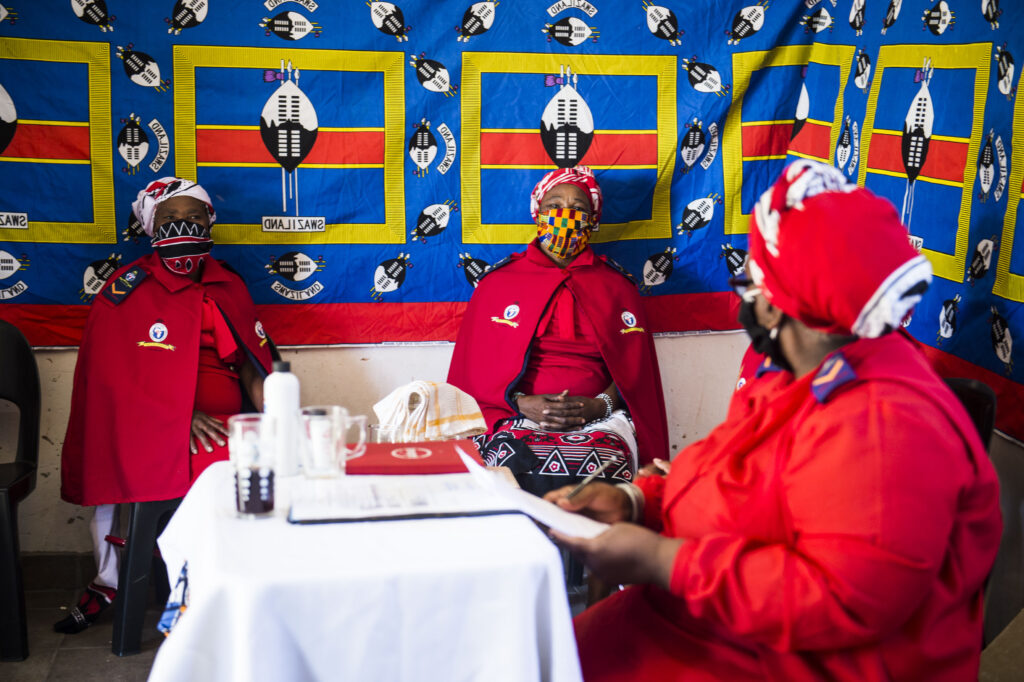 Muti / medicine used to treat patients at a sangomas indumba (Delwyn Verasamy/M&G)
Muti / medicine used to treat patients at a sangomas indumba (Delwyn Verasamy/M&G)
Covid-19 guidelines for traditional healers were released in May 2020, after some pressure and consultation with bodies such as the THO.
The guidelines classify traditional health practitioners as essential workers who require permits to move around under the specific lockdown conditions, but not for the work itself. They list the roles traditional healers should play in the pandemic, including triaging and referral of patients to appropriate levels of care as well as public health messaging. Most, however, agree that the communication was not clear and enforcement not uniform.
“It depends on how clued up you are on the systems of the government,” says Makhosi Gwiji Gqoli, the chairperson of the Ugu district in KwaZulu-Natal for the National Unitary Professional Association for African Traditional Health Practitioners of South Africa.
He used his permit to travel to clients around the country but says this had its issues, such as finding and getting spiritually acquainted with new spaces in nature.
Although healers were able to get permits, the clients who needed to be present for certain rituals could not. Several healers say they believe law enforcement officials added to the difficulties or confusion, and that it may have been easier in rural areas to access nature without a permit.
Makhosi Gwiji Gqoli says that they tried to play it safe at times by hiring larger vehicles to transport groups of people to ritual spaces while still under the maximum limit for passengers: “We tried to find loopholes around it to work.”
He says several rituals, including the initiation of new healers, were not possible and remain suspended.
GogoOnline is a database for traditional healers that was launched during lockdown to advertise their services. Co-founder and healer in training, Xhanti Madolo says that while the platform observed healers accessing permits, he believes healers were held back not just by the lockdown regulations but by a historical lack of recognition.
“The traditional healer space is not as recognised as the Western doctors to begin with. So you find that the permits that were given were sort of a blanket one and not specific to how you heal or how you don’t heal, and how many people you can get [to attend to].“
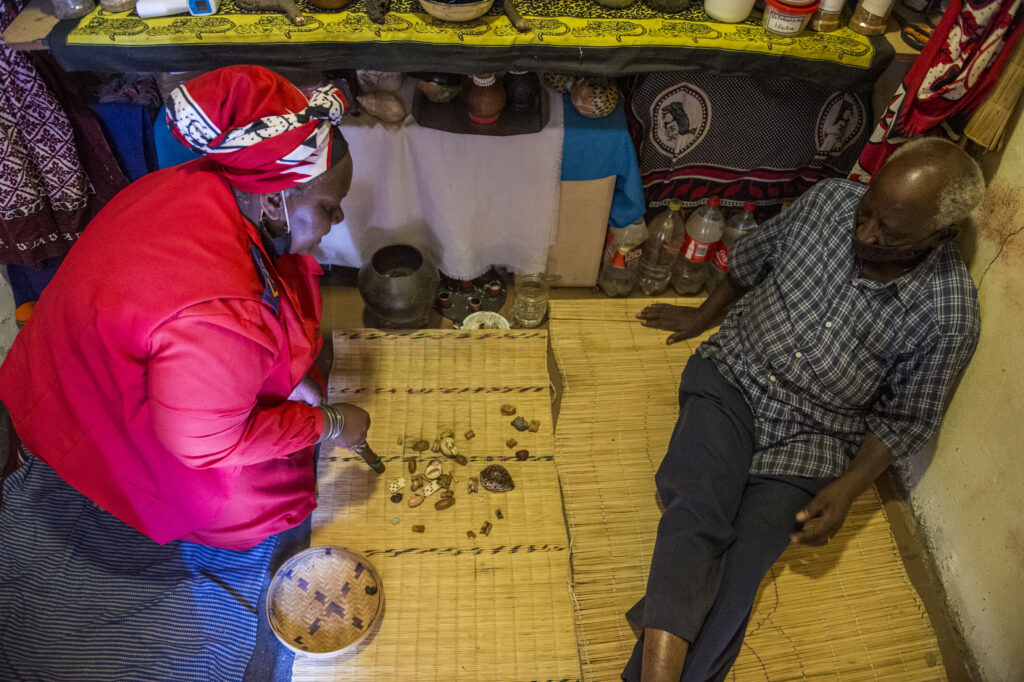 Gogo Mmalai Molahlegi consulting a patient. (Delwyn Verasamy/M&G)
Gogo Mmalai Molahlegi consulting a patient. (Delwyn Verasamy/M&G)
Healing online
Perhaps unsurprisingly, many of these healers have moved some of their work online, through telephonic and video calls. Gogo Simenjalo had already been connecting with her community through social media and videos and blogs on her media platform, AfroSavvy. But, she still had to learn to set up correctly for virtual consults.
“It’s challenged me. I had to actually learn new skills. So I think that it’s not only opened up new avenues, it’s forced me to just buckle up and catch up with technology.”
Like others who have made this step, Gogo Simenjalo says she consulted with her ancestors to work this way and advises her clients to make sure their own ancestors are also comfortable with this. To strengthen the connection, she lights a candle on her side and asks the client to do the same.
Gogo Dumolubomvu had already consulted online but increased this during the pandemic.
“I think I’ve been quite fortunate in that even before lockdown, I was already doing online consultations,” says the Johannesburg-based healer who is originally from the Eastern Cape: “I’d say roughly 40 to 50% of my clients are not based in Gauteng.”
Several healers say this digital move has positively opened up new clientele further afield.
Madolo says that at Gogo Online they have been observing an interest in South African healers from places afar afield as Jamaica, the United Kingdom and Russia.
Not all clients feel comfortable with this shift, however. Gogo Mshunqisi is based in the small town of Bizana, in the Eastern Cape, and says that while she does offer digital sessions, particularly for those clients far away during the pandemic, few use it.
She has adapted her practice in other ways, though: “The way I practise is that I teach my clients how to conduct their own cleansing ceremonies and prayer sessions so that they can cleanse themselves in their own homes.”
Mkhulu Mkhontokayise says that although his ancestors allowed him to offer telephonic consultations, this was difficult: “Some of the older citizens prefer the old way of healing where you just walk in the shrine.
“Some of the services we can’t offer until we are moved to a different level which will allow certain rituals to take place .”
Gogo Mmalai Molahlegi performs a ritual
Lack of support
This feeds into a greater sense that the government did not recognise healers’ roles in the pandemic and consult them early enough.
Professor Nceba Gqaleni — who is part of the World Health Organisation’s expert advisory committee on Traditional Medicine for Covid-19 and the task team drafting South Africa’s policy on African traditional medicine for the department of health — says the notion of supporting traditional healers is usually paid lip service without any political will.
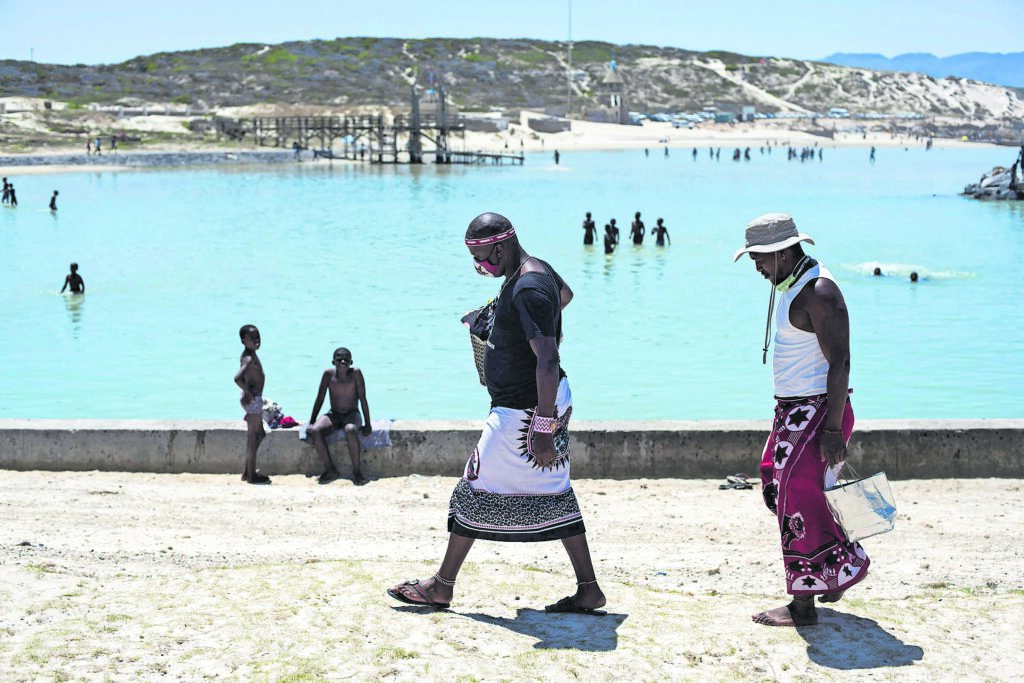 Sangoma Lucky Jayden performs a ritual along with student Mhlekazi Vulindlela honouring the water spirits at Monwabisi beach, Khayelitsha. (David Harrison/M&G)
Sangoma Lucky Jayden performs a ritual along with student Mhlekazi Vulindlela honouring the water spirits at Monwabisi beach, Khayelitsha. (David Harrison/M&G)
In terms of Covid-19, this relates to how healers were consulted in handling the pandemic and how their role as frontline workers was clarified.
It was felt in practical ways, such as when he had to buy his own personal protective equipment, says Makhosi Gwiji Gqoli.
“The government is trying its best, but it is not enough.”
Gogo Molahlegi says healers who had lost their income hoped for financial support or food. She says the government “restricted us even more than any other sector of essential workers. We are called essential workers but when we are supposed to practise, like now, we cannot”.
Many healers felt their traditional knowledge around healing illnesses was not taken into consideration seriously.
“As herbalists, we need to be afforded the same opportunity as Western doctors to come up with cures for illnesses,” says Gogo Kamo.
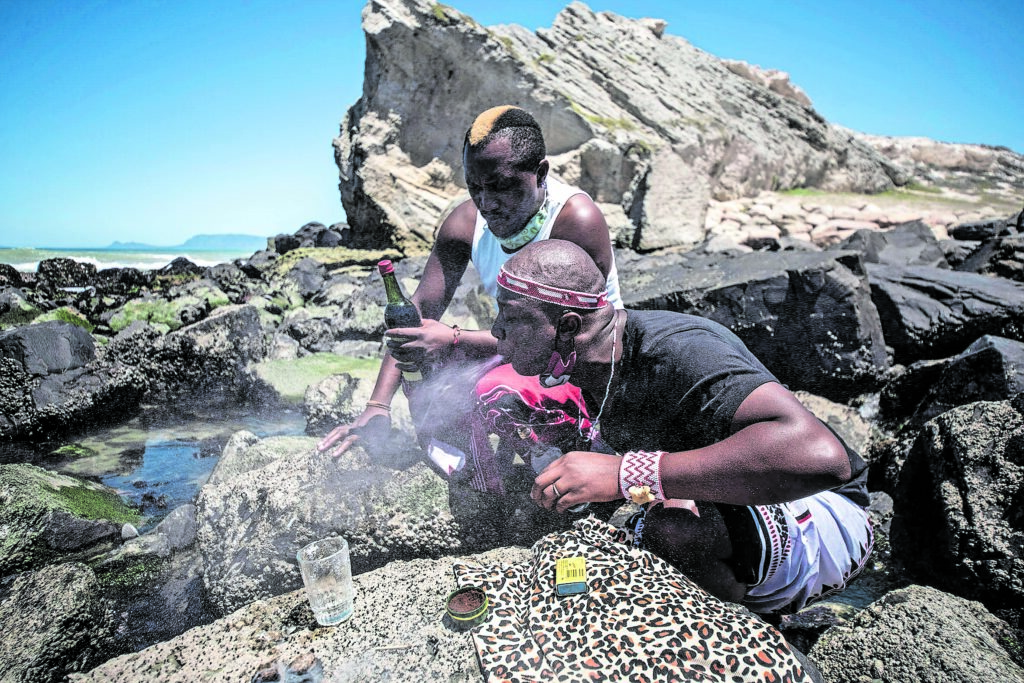 Sangoma Lucky Jayden performs a ritual along with student Mhlekazi Vulindlela honouring the water spirits at Monwabisi beach, Khayelitsha. (David Harrison/M&G)
Sangoma Lucky Jayden performs a ritual along with student Mhlekazi Vulindlela honouring the water spirits at Monwabisi beach, Khayelitsha. (David Harrison/M&G)
Researchers such as Gqaleni have been working with the government to fast track clinical trials and studies of plants such as artemisia annua (mhlonywane or lengana).
He says, however, that there had been a lot of uncontrolled or unhelpful use of such remedies early on in the pandemic and that healers should have played a more central role.
“Their voice and their space to advise communities on these things was not there.”